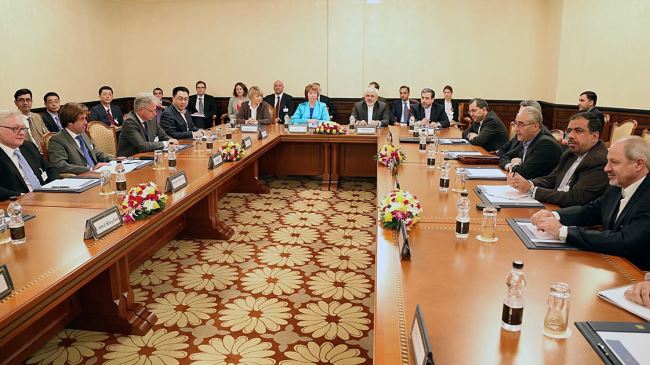 Representatives of Iran and the P5+1 hold a round of nuclear talks in Muscat, Oman, on November 11, 2014.[/caption]
Representatives of Iran and the P5+1 hold a round of nuclear talks in Muscat, Oman, on November 11, 2014.[/caption]After 12 years of rising tensions, threats of war and failed diplomacy, this accord would silence for good fears of Tehran developing nuclear weapons � an ambition it has always denied.
VIENNA, Austria � Iran and 6 world powers begin a final round of talks in Vienna on Tuesday, November 18, aiming to overcome significant remaining differences and agree a historic nuclear deal by a November 24 deadline.
"There's still a big gap. We may not be able to get there," US President Barack Obama warned last Sunday, November 9.
After 12 years of rising tensions, threats of war and failed diplomacy, this accord would silence for good fears of Tehran developing nuclear weapons � an ambition it has always denied.
Success could put Iran and the West on the road to improved relations after 35 years in the deep freeze. Failure could mean renewed Iranian nuclear expansion and even military action.
But US and Iranian negotiators are under severe domestic pressure not to give too much away, not least in Washington after Republicans snatched the Senate majority earlier this month.
It was on November 24 last year, after moderate Hassan Rouhani became president, that Iran and the P5+1 � UN Security Council permanent members Britain, China, France, Russia and the United States plus Germany � secured an interim atomic agreement.
They missed however a July 20 deadline to reach a comprehensive accord, agreeing to give themselves four more months, until November 24.
US Secretary of State John Kerry said at the time that the talks were "the best chance we've ever had to resolve this issue peacefully".
And now, says chief US negotiator Wendy Sherman, it is "time to finish the job".
Failure would be a "dangerous scenario for the entire world," her Iranian opposite number Abbas Araqchi said.
Unity despite Ukraine
Despite tensions between Russia and the West over the Ukraine crisis the six powers have been united over Iran. Kerry and his Russian counterpart Sergei Lavrov on Wednesday made a joint call for a deal.
The powers want Iran to scale back its nuclear program in order to make any rush to build a nuclear bomb virtually impossible. In return Iran wants painful sanctions lifted.
Some areas appear provisionally sewn up, like altering a reactor being built at Arak, a different use for the Fordo facility � under a mountain to protect it from air attack � and more inspections.
But the big problem remains enrichment, which renders uranium suitable for power generation and nuclear medicines � but also, at high purities, for a weapon.
Iran wants to ramp up massively the number of enrichment centrifuges in order, it says, to make reactor fuel. The West wants them slashed, saying Iran has no such need at present.
"There will be no backward steps" in the nuclear program, Araqchi said last month.
There may however be some wiggle room if Iran neutralizes or exports � perhaps to Russia � some or all of its uranium stockpiles.
Other thorny issues are the duration of the accord and the pace at which the tangled web of sanctions is undone, an area where Iranian expectations are "excessive", one Western diplomat said Friday, November 14.
"They want everything, all at once and this is not realistic," the diplomat involved in the talks said.
11th hour breakthrough?
Observers say the talks were always going to go down to the wire.
"If there is to be a deal, the gaps won't be bridged until the 11th hour. Doing so ahead of time would be seen as not having fought enough," Mark Fitzpatrick at the International Institute for Strategic Studies told Agence France-Presse.
Not that this means they will succeed, however.
"There is virtually no possibility that a complete deal will be concluded by November 24," Robert Einhorn at the Brookings Institute told Agence France-Presse. "I think they'll agree to extend the interim arrangements for several more months."
For now though, officials on all sides insist that another extension is not on the cards. Russia's negotiator Sergei Ryabkov has said no one was working on a "plan B".
"A deal is within reach by November 24 and both sides are committed to getting the job done," Arms Control Association analyst Kelsey Davenport told Agence France-Presse.
By Rappler
The Iran Project is not responsible for the content of quoted articles.










